Coordinación
Una coordinación sólida puede evitar vacíos y duplicaciones en las respuestas humanitarias, así como garantizar que los PTM complementen otros tipos de asistencia. Sin embargo, el informe del «Estado Global de los Programas de Transferencias Monetarias» de la CALP Network muestra que la coordinación de la asistencia en efectivo es vista como débil y ad hoc, y que esto está teniendo graves repercusiones operativas.
Los donantes, las ONG y los líderes de los grupos de trabajo de transferencias monetarias (GTM) han pedido claridad sobre tres temas principales relacionados con la coordinación de la asistencia en efectivo:
- Quién debe ser responsable de asegurar una coordinación eficaz de la asistencia en efectivo;
- Cuál es la función y el mandato de los grupos de trabajo de transferencias monetarias, incluso en relación con las transferencias monetarias multipropósito;
- Cómo se debe dotar de recursos a la coordinación de asistencia en efectivo.
Tenemos que basarnos urgentemente en lo que funciona y proporcionar claridad a nivel mundial sobre las preguntas arriba mencionadas, adaptándonos a los diferentes contextos. Hace mucho tiempo que se deberían haber tomado decisiones claras basadas en necesidades operativas y no en la política de las agencias.
Prioridades actuales
El objetivo de la CALP Network es contribuir a seguir progresando en este tema en tres niveles: apoyar a los grupos de trabajo de transferencias monetarias a nivel regional; contribuir a soluciones prácticas para la coordinación de la asistencia en efectivo a nivel mundial; y convocar una discusión basada en la evidencia sobre temas clave, destacando puntos de decisión críticos y oportunidades de progreso.
Contenido destacado

Cash Coordination Tip Sheet
Guidelines and Tools
This tip sheet sets out established best practice, key guidance and resources for all aspects of cash coordination, intended as a clear, accessible and action-oriented guide for those engaged in coordination of cash and voucher assistance (CVA) at the field level.

Introducing the Cash Coordination Tip Sheet
Webinar
The CALP Network has developed a tipsheet setting out established best practice and key guidance and resources for all aspects of cash coordination, intended as a clear, accessible and action-oriented guide for those engaged in coordination of cash and voucher assistance at the field level.

Cash Coordination: A proposal from members in MENA
Blog Post
Earlier this year the CALP Network undertook regional consultations to explore options for cash coordination. This blog lays out recommendations from participants from the Middle East and North Africa who sketched out what cash coordination, and coordination more broadly, could look like in future to support a more effective, efficient and accountable response.
Últimos recursos

Prepaid Card Products For Humanitarian Programs: Actors, Insights & Recommendations
Guidelines and Tools
Today, over 130 million people need humanitarian support to survive. Fortunately, new tools such as prepaid cards allow us to respond to these needs with increasing flexibility and efficiency. Today’s leading humanitarian agencies are increasing their use of prepaid cards in places like Jordan, the...
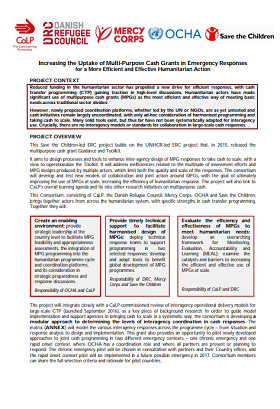
Increasing the Uptake of Multi-Purpose Cash Grants in Emergency Responses for a More Efficient and Effective Humanitarian Action
Report
Reduced funding in the humanitarian sector has propelled a new drive for efficient responses, with cash transfer programming (CTP) gaining traction in high-level discussions. Humanitarian actors have made significant use of multipurpose cash grants (MPGs) as the most efficient and effective way of meeting...
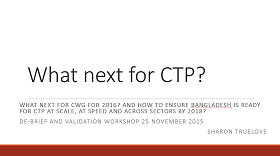
What next for CTP?
Report
What next for CWG for 2016? and how to Ensure bangladesh is ready for CTP at scale, at speed and across sectors by 2018? De-Brief and validation Workshop 25 November 2015
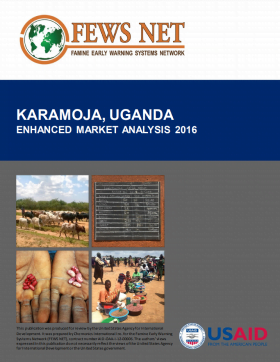
Karamoja, Uganda: Enhanced Market Analysis
Report
The Market Fundamentals reports serves as starting points for providing efficient and effective market-based response decision support for both emergency and development programs in Karamoja Region of Uganda. It examines the appropriateness and feasibility of modality response options for the region.
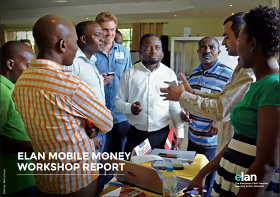
ELAN Mobile Money Workshop Report
Report
The Electronic Cash Transfer Learning Action Network (ELAN) hosted two mobile money workshops in January 2016 in Dakar (Senegal) and in Gisenyi (Rwanda). The workshops were attended by 52 individuals from seven countries across West Africa and the Great Lakes region representing 16...
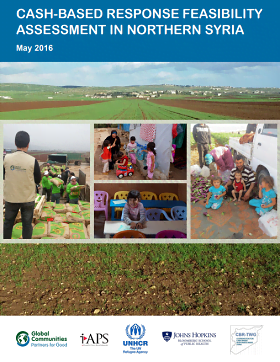
Cash-based Response Feasibility Assessment in Northern Syria
Case Study
As the conflict in Syria extends beyond the fourth year, there is need for a widespread humanitarian response focused on urban areas that addresses humanitarian needs and promotes resilience for the 13.5 million people in need of protection and humanitarian assistance within Syria. The majority of...
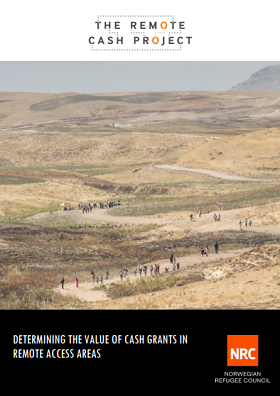
Determining the Value of Cash Grants in Remote Access Areas
Guidelines and Tools
This review aims to complement the work of NRC within the framework of the ECHO funded Remote Cash Project by providing a comparative analysis of different means of determining the size of cash grants, with the development of practical recommendations for approaches that can be used in hard to access...

Cash/Food. A Comparative analysis of the effectiveness of food assistance modalities in refugee settlements
Report
A comparative analysis of the effectiveness of food and cash assistance modalities for household food security in refugee settlements

The Revival of the “Cash versus Food” Debate: New Evidence for an Old Quandary?
Report
The longstanding “cash versus food” debate has received renewed attention in both research and practice. This paper reviews key issues shaping the debate and presents new evidence from randomized and quasi-experimental evaluations that deliberately compare cash and in-kind food transfers in ten...

Using Cash for Shelter: An Overview of CRS Programs
Report
Cash continues to gain prevalence as a modality for humanitarian agencies to help people meet multiple and diverse needs in the wake of a crisis. It provides people with the dignity of choice, and is often significantly more cost-efficient than the delivery of in-kind aid. In programs with a shelter...

Afghanistan Emergency Response Mechanism (ERM)
Report
The Afghanistan Emergency Response Mechanism (ERM) was selected as a case study to illustrate the ‘alliance’ form of inter-agency collaboration for sector-focused cash assistance, with semi-formal relationships and separate funding flows between members. It is distinctive from other cases in that cash...

Pintakasi. A review of shelter/Wash delivery methods in post-disaster or recovery interventions
Report
Catholic Relief Services conducted an in-depth study to assess the efficiency, effectiveness and appropriateness of the modalities for delivering shelter and Wash assistance in its Typhoon Haiyan Recovery Program. This study, Pintakasi hopes to contribute valuable lessons learned and share best...

Post Distribution Monitoring Report: Cash Based Interventions in Lebanon (Jan-March 2016)
Report
This post-monitoring report relies on several quantitative and qualitative approaches to evaluate the process, performance and impact of the cash based interventions (CBI) undertaken between January and March 2016, contrasting these with the results obtained in the post-distribution monitoring report...
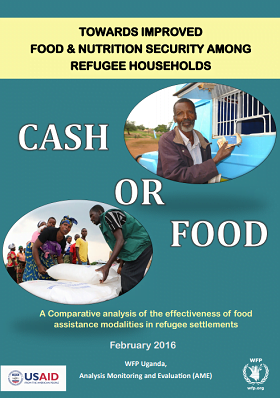
Cash or Food A Comparative analysis of the effectiveness of food assistance modalities in refugee settlements
Report
A comparative analysis on the effective of food and cash transfer modalities for household food security in refugee settlements in Uganda.
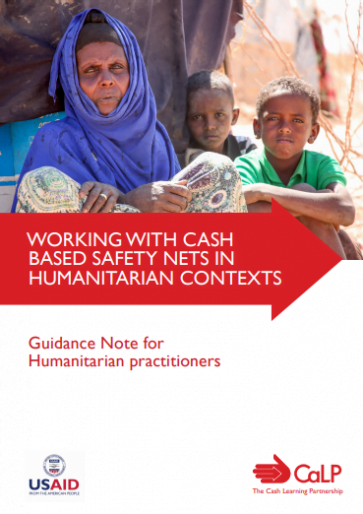
Working with Cash-based Safety Nets in Humanitarian Contexts: Guidance Note for Humanitarian Practitioners
Guidelines and Tools
Over the past decade, social protection has emerged as an important social policy measure to tackle poverty and inequality in society, and to address vulnerability to shocks. In line with these developments, there has been increasing interest in forging better links between humanitarian assistance and...
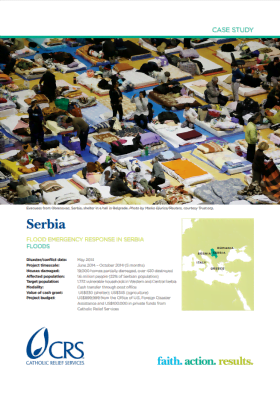
Using Cash for Shelter: Flood Emergency Response in Serbia
Case Study
The devastating floods that affected the Balkans in May 2014 affected 1.6 million people, 22 percent of Serbia’s population, and have set the country’s economic development back decades. Catholic Relief Services (CRS) conducted rapid assessments in 13 villages in the municipalities of Šabac, Valjevo,...
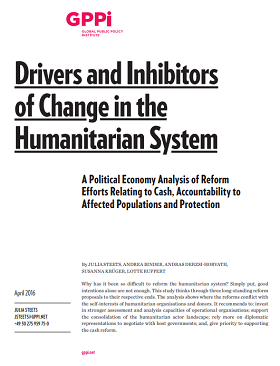
Drivers and Inhibitors of Change in the Humanitarian System
Report
This study analyses the drivers and inhibitors of change in the humanitarian system. It focuses on three reform efforts: cash-based emergency response, accountability to affected populations and protection. For each area, the study explores four questions to help explain why reforms are successful or...

Building on social protection systems for effective disaster response: the Philippines experience
Report
How can social protection systems be used in disasters, as a complement to, or substitute for, humanitarian assistance? Oxford Policy Management led a two-year research project investigating this question, looking at the role of social protection in both mitigating the impact of large-scale shocks and...

ELAN Workshop Report: E-Transfers in Iraq and Syria
Report
This report outlines the main conclusions and takeways of ELAN workshop held in Iraq. The event was organized to meet the following objectives: Introduce participants to the what, why, and when of e-transfers. Explore solutions to the particular challenges of using e-transfers in Iraq and Syria. Share...
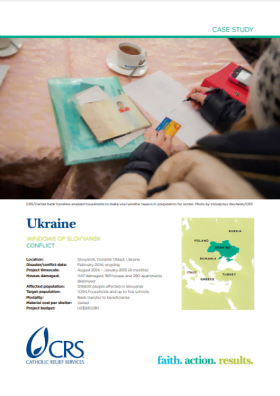
Using Cash for Shelter: Windows of Slovyansk
Case Study
After pro-Russian separatists declared republics in Eastern Ukraine in April 2014, Slovyansk became a focal point of fighting between government forces and rebels until the Ukrainian military retook the city in early July. Slovyansk saw the heaviest fighting of any urban area and many city dwellers fled....